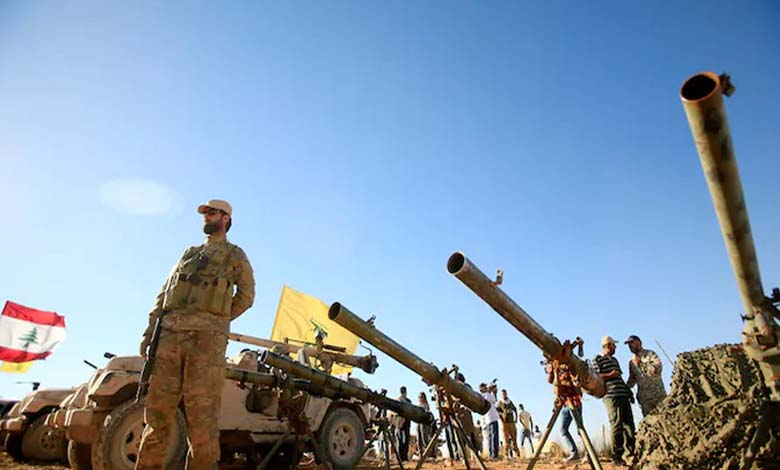From Disarmament to Rearmament… Hezbollah Moves as Israel Loses Patience

Intelligence reports indicate that Hezbollah is rearming itself in defiance of the ceasefire agreement, pushing the region toward the brink of a new confrontation with Israel.
-
Disputes shake Hezbollah’s media apparatus and turn into a power struggle
-
Millions for Information on a Hezbollah Financier: Who is Ali Qasir, Wanted by Washington?
According to a report in The Wall Street Journal, Lebanon’s Hezbollah is rebuilding its weakened ranks, challenging the terms of the ceasefire, and raising the likelihood of renewed conflict with Israel.
The American newspaper, citing unnamed informed sources, reported that intelligence data shows Hezbollah, backed by Iran, is restocking its supplies of rockets, anti-tank missiles, and artillery.
One source noted that some of these weapons “arrive via seaports and smuggling routes through Syria,” while “Hezbollah is also manufacturing some of its new weapons domestically.”
-
Hezbollah Cell in Syria: Details of the Terrorist Plot and Heavy Weapons Seizure
-
Hezbollah member injured in Israeli strike on Lebanon
This rearmament effort is straining the agreement that ended a two-month-long Israeli military campaign against the group a year ago.
The agreement required Lebanon to begin disarming Hezbollah in parts of the country before expanding the process nationwide, in accordance with a previous accord.
However, the group insisted on retaining its weapons under the pretext of defending Lebanon’s sovereignty.
-
Hezbollah and disarmament: cautious approval or a tactic to buy time?
-
Lawsuit Filed Against Hezbollah’s Deputy Secretary-General for Threatening Lebanon with Civil War
Israel “loses patience”
According to several sources, Israel has begun losing patience, expressing anger over the new intelligence findings. The issue, originally focused on Hezbollah’s disarmament, has now shifted within months to its rearmament.
Tom Barrack, the US ambassador to Turkey and Washington’s chief envoy to Lebanon and Syria, said earlier this month, “If Beirut continues to hesitate, Israel may act unilaterally, and the consequences will be severe.”
Lebanese leaders, through Arab and American mediators, have asked Israel for patience and expressed willingness to increase intelligence sharing and coordination, despite the two countries being technically at war, the newspaper reported.
-
Hezbollah threatens civil war in Lebanon and warns of a Karbala-style battle
-
Hezbollah threatens Lebanon with a Karbala-style battle to keep its weapons
In this context, The Wall Street Journal noted that the office of the Lebanese Prime Minister declined to comment, and neither the presidency, the army, nor Hezbollah responded to requests for statements.
In an interview broadcast this October on a Hezbollah-affiliated television channel, Naeem Qassem, the group’s current Secretary-General, stated that coordination between the Lebanese army and Hezbollah was necessary, but attempts to disarm the group should be resisted.
He added that Hezbollah seeks to avoid another war with Israel and has not responded militarily to Israeli airstrikes since the truce.
-
Hezbollah Faces a Silent Collapse: Missing Leadership, Besieged Weapons
-
Beirut Port Explosion Anniversary: Justice Moves Forward Despite Hezbollah’s Obstruction
Following Hamas’s attacks on October 7, 2023, Hezbollah launched rockets at Israel almost daily, forcing Israel to evacuate several northern areas.
Israel’s air and ground retaliations were among its most destructive campaigns against the group, with thousands of strikes and explosions severely weakening Hezbollah’s forces.
The ceasefire agreement signed last November stipulates that disarmament should begin south of the Litani River, while the Lebanese president and prime minister have called for extending it across the country to ensure that the state holds a monopoly on the use of force.
-
U.S. Patience Wears Thin as Hezbollah Disarmament Stalls
-
Hezbollah resists internal and external pressure to disarm
The government has made progress in the southern regions long controlled by Hezbollah, where disarmament has often occurred with the group’s approval.
However, in other areas where the movement retains significant influence, such as Beirut’s southern suburbs and the Bekaa Valley, progress has met with strong resistance, according to the newspaper.
-
After a Defeat… Hezbollah Now Ties the Decision to Go to War to the Lebanese State
-
Israel strikes Hamas, Hezbollah, and Houthi “weapons supply line” in Iran… Who is Behnam Shahriari?












